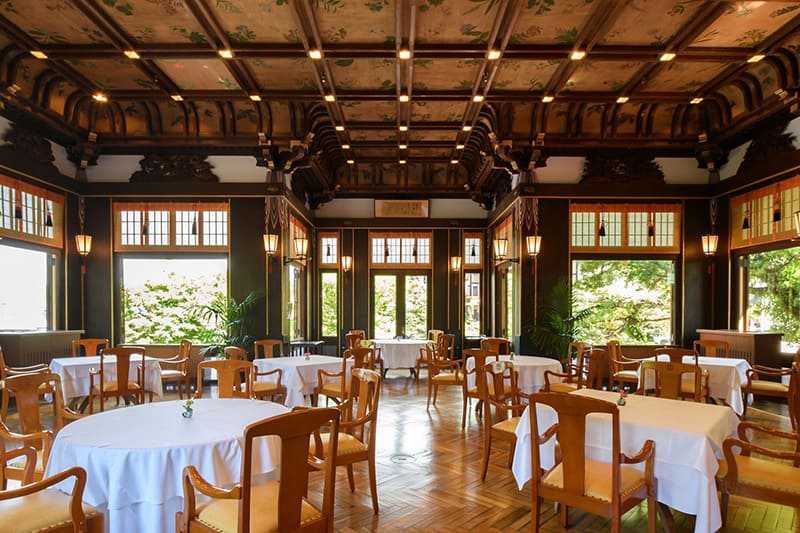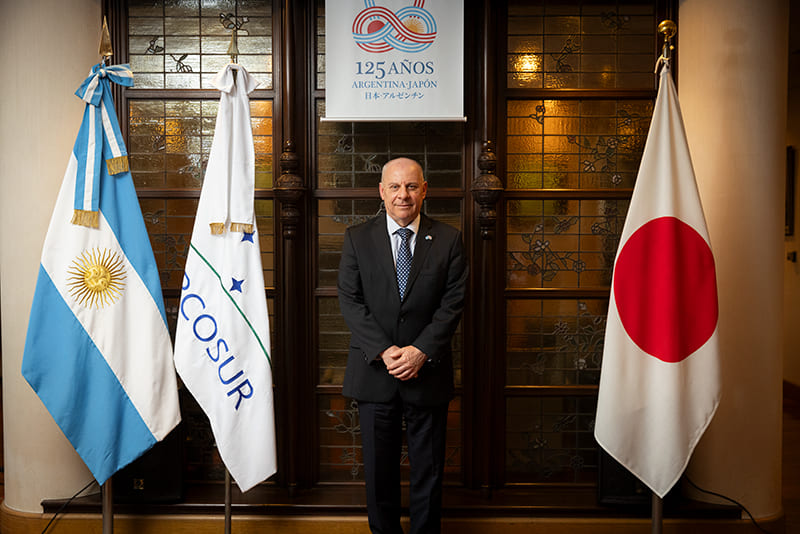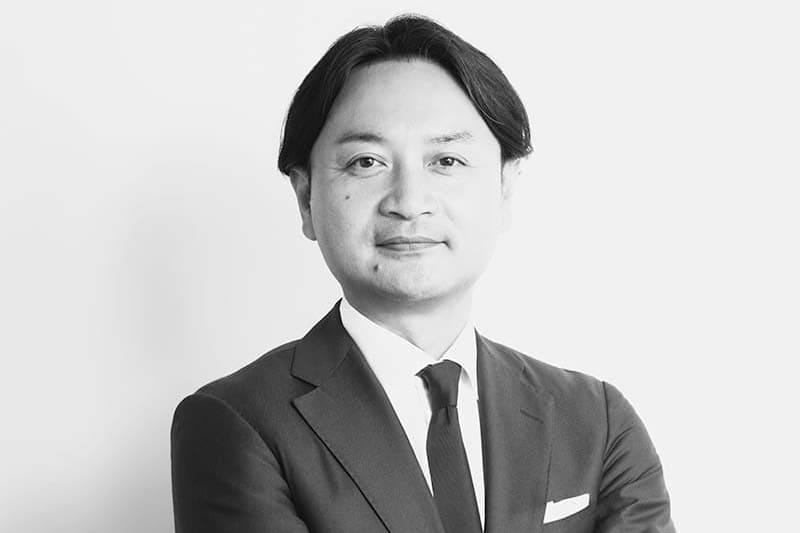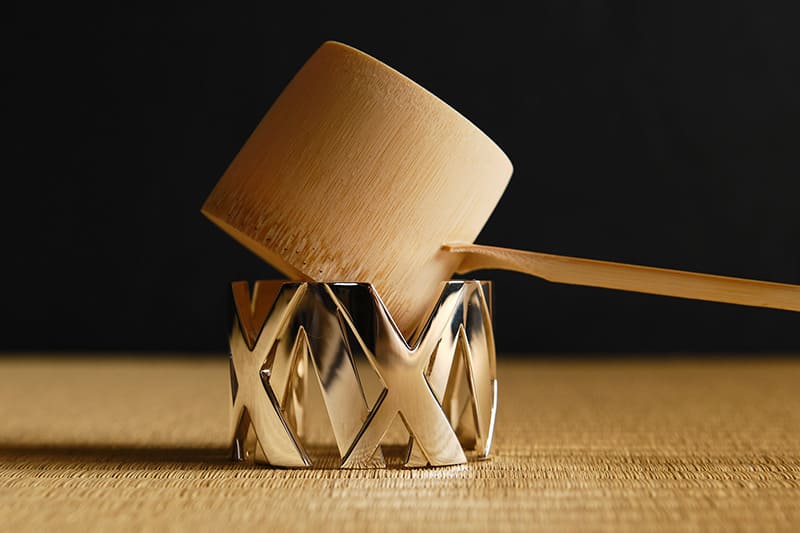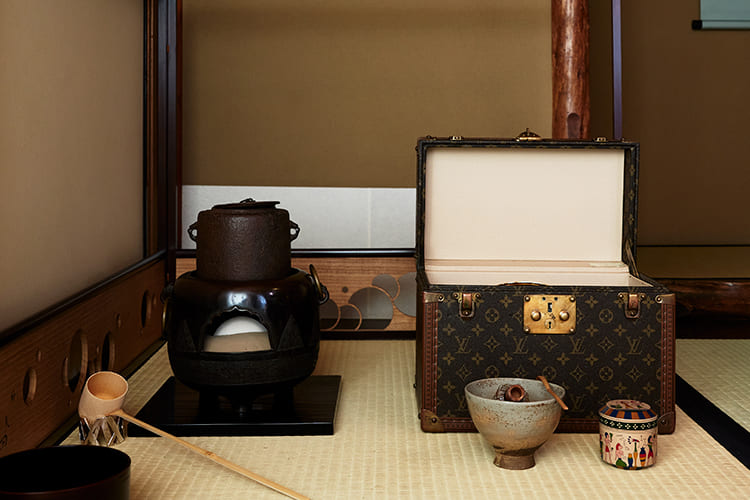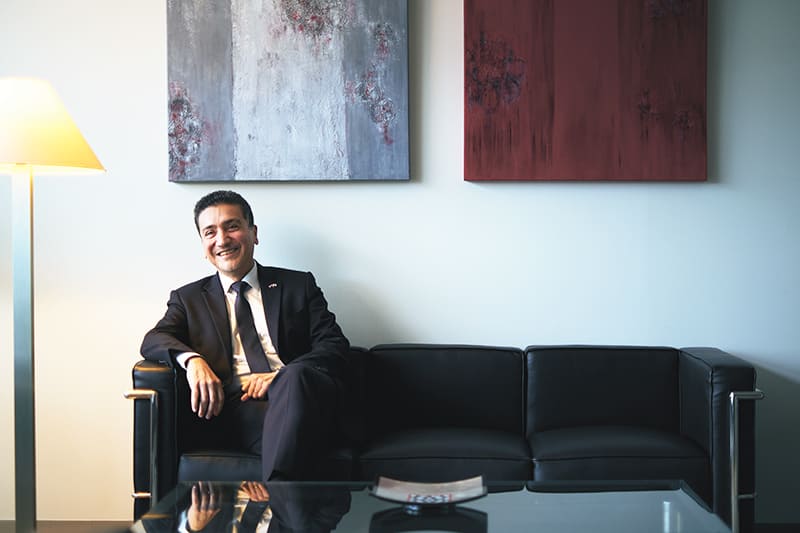January 24, 2025
Cultural exchange from Georgia, birthplace of wine
GEORGIA
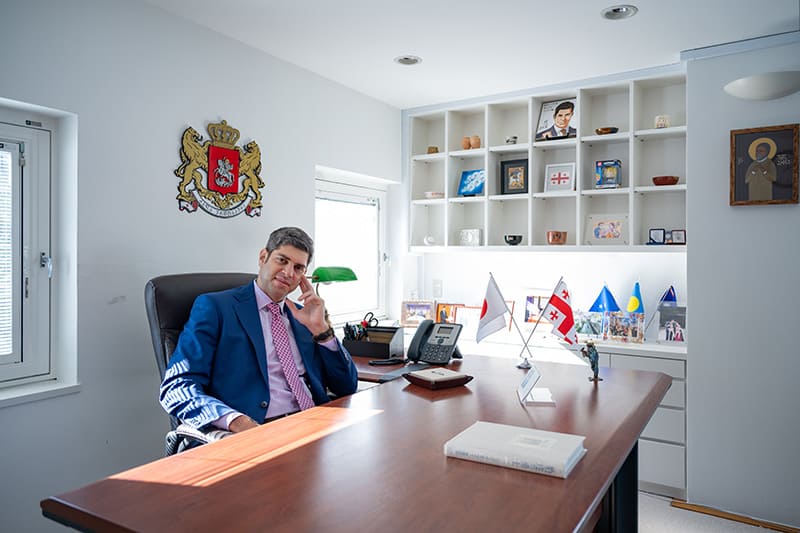
PHOTOS: TAKAO OTA
The ambassador to Japan whose name and face are most familiar to Japanese people today is undoubtedly Georgia’s Teimuraz Lezhava. He first came to Japan at the age of 4 in 1992, when his biologist father was employed at the Institute of Physical and Chemical Research (Riken). He attended Japanese public schools and graduated from Waseda University. His distinctive career history includes employment at the Japanese company Kikkoman Corp., starting in 2012, and joining Georgia’s Ministry of Foreign Affairs in 2018. Naturally, he is fluent in Japanese. He posts in Japanese on X, where he currently has over 350,000 followers. He smiled as he recounted a childhood memory: “When I was going to Japanese elementary school, I went to a friend’s house after school. We played games, and his grandmother served us watermelon. I must be the only ambassador to Japan who has had that kind of experience. I think that’s probably my strength.”
Situated at the intersection of Asia and Europe, Georgia has throughout its history preserved its unique language, Georgian, and religion, Georgian Orthodox, even as it was buffeted about by powerful countries in the region. In April 1991, with the collapse of the Soviet Union, Georgia declared independence. Today it is bordered by Russia to the north, Turkey to the south, Azerbaijan to the east and the Black Sea to the west.
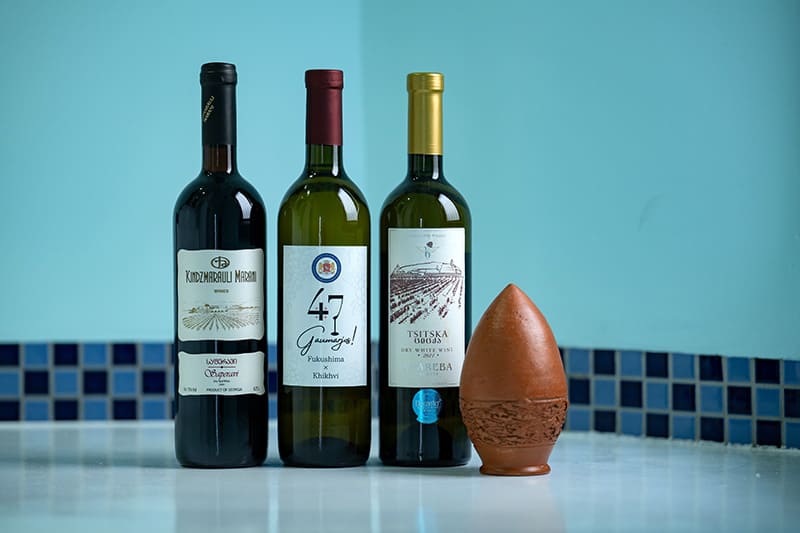
The Embassy of Georgia is located in a house in the Minamiaoyama area of Tokyo’s Minato Ward. The day of our visit, the ambassador’s first words after we exchanged greetings were, “With war and division so prevalent in the news today, cooperation between countries with shared values such as freedom, democracy and respect for human rights is very important.” He emphasized the great importance of culture and cultural exchange. With regard to relations between Georgia and Japan, he is currently focusing on three cultural exchange initiatives. One of these is the social media activity mentioned above. The others are “wine diplomacy” and “dissemination of Japan-Georgia cultural comparison through the tea ceremony.” In recent years Georgia has become well known among connoisseurs for its wine production — but what is wine diplomacy?
Lezhava said, “The first initiative I’d like to talk about is wine diplomacy. In this cultural exchange project, I visit Japan’s 47 prefectures and present them with Georgian wine made from specifically Georgian grape varieties. Georgia, the birthplace of wine, has a wine history of 8,000 years and has 525 grape varieties. I present wines selected to go with the climate and history of each region of Japan. In December 2024, for instance, I went to Fukushima Prefecture and gave the prefecture a gift of Khikhvi grape seedlings. During the Soviet era, this variety almost ceased to exist at one point, but in recent years it’s made a resurgence and gained popularity. In presenting this gift, I related Khikhvi’s story to the revival of Fukushima. I’ve visited 28 prefectures so far.”
Last October, he visited Ishikawa Prefecture, which suffered severe damage in the 2024 Noto Peninsula earthquake, and presented grape seedlings and wine to the governor. He had also been to Ishikawa the previous February, just a month after the earthquake. At that time he visited the Noto Wine Co. in the town of Anamizu. In one sense this was a visit of support to a winery that makes wine from the Georgian grape variety Saperavi. But the ambassador had another special reason.
“Actually, on January 1st, 2024, my family was heading to Ishikawa Prefecture for vacation. The earthquake happened when we were on the shinkansen train, and shinkansen operation was stopped. We ended up spending the night on the train — then we had to turn around and go back to Tokyo, and couldn’t go to Ishikawa Prefecture. So I decided to visit affected places as soon as possible to pray for their recovery.”

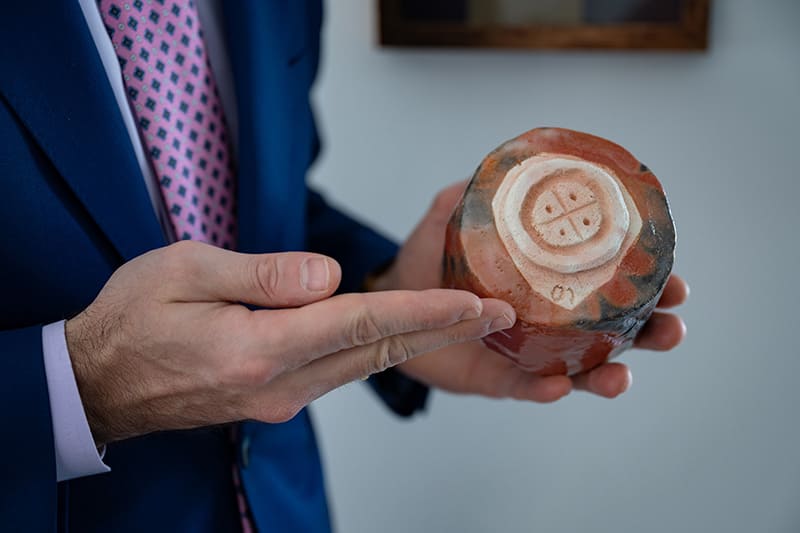
A raku ware teacup made by the ambassador in Kyoto. Georgia’s flag is inside the base ring.
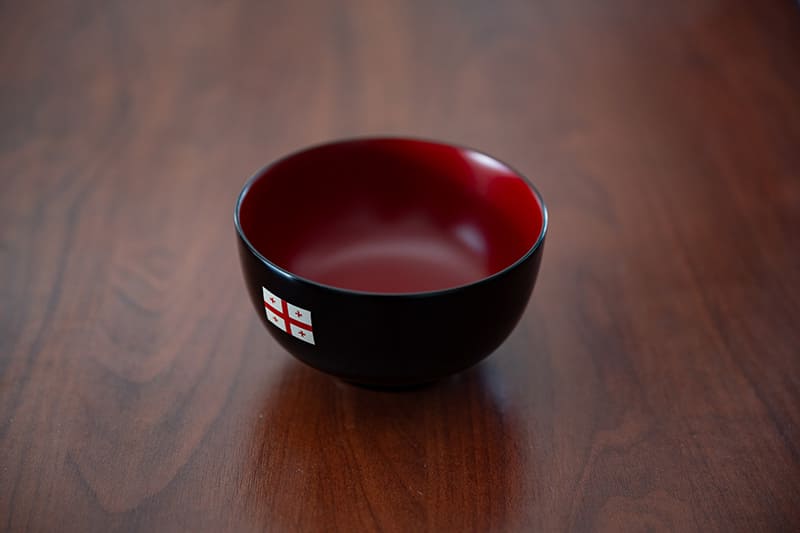

He then spoke about his other cultural initiative. “Japan has the tea ceremony, and Georgia has a similar ‘wine ceremony.’ This is a traditional Georgian feast culture called ‘supra.’ In the Japanese tea ceremony, the host shows omotenashi (hospitality) by delighting guests’ eyes with a hanging scroll, teacups and so on. In a Georgian banquet, there’s a toastmaster/host called a tamada, who shows hospitality to guests by reciting poetry and singing. I think the fact that a ceremony created around a beverage was developed into a special culture is something very rare among the countries of the world. It isn’t just about drinking a beverage, it’s about the participants sharing deep values which go beyond that. It’s interesting to me that Japan and Georgia have this cultural point in common.”
In 2021 the ambassador started practicing and further exploring the tea ceremony himself. Additionally, throughout 2024 he contributed 12 articles in Japanese to the Urasenke tea ceremony school’s magazine, Tanko. His subjects included comparison of Japan’s tea ceremony culture and Georgia’s supra culture.
Lezhava said that, being quite young compared to other countries’ ambassadors, he makes a special effort to actively visit many places in order to increase awareness of Georgia’s appeal. At the same time, his presence and social media posts have had a major effect in terms of Japan-Georgia friendship. At the end of 2024, a new president of Georgia was sworn in, and ongoing negotiations with the EU about the country’s EU accession were suspended. In such circumstances, the importance of the ambassador’s cultural exchange activities in Japan is likely to increase even more.
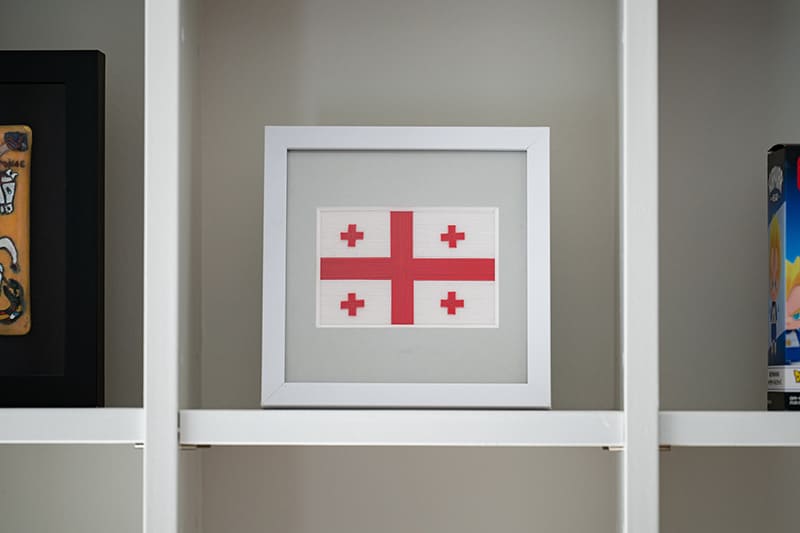
TEIMURAZ LEZHAVA
Born in 1988, Lezhava moved to Japan with his family in 1992 for his father’s work. From that time until university graduation, he was educated in Georgia, Japan, the United States and Canada. In September 2011, he graduated from Waseda University’s School of International Liberal Arts. He worked in foreign sales and marketing at Kikkoman Corp. from 2012 to 2015, and for three years starting in September 2015 was engaged in Japan-Georgia economic activities. In December 2017, he founded LLC Delivery. In October 2018, he joined Georgia’s Ministry of Foreign Affairs, and from August 2019 to November 2021 he served as charge d’affaires at the Embassy of Georgia to Japan. He has been ambassador of Georgia to Japan since Nov. 15, 2021. He has over 350,000 followers on the social media platform X.
ワイン発祥の国の大使が展開する文化交流。
いま一般の日本人に一番顔と名前が知られている駐日大使は、ティムラズ・レジャバ駐日ジョージア大使といって間違いないだろう。1992年、4歳の時に来日。日本の公立学校でも教育を受け、早稲田大学を卒業。2018年にジョージア外務省に入省という経歴をもつ。日本語で発信する「X」のフォロワー数は現在35万人を数える。
ジョージアはアジアと欧州の境目に位置し、昔から周囲の大国に翻弄されながらも独自の言語と宗教を守ってきたという歴史を持つ。そんな国の大使が力を入れている文化交流の活動が3つあるという。それが「SNS発信」と「ワイン外交」、「茶道を通じた日本とジョージアの文化比較の発信」。ジョージアと言えば、近年ワイン通の間では美味しいワインの産地として知られるが、ワイン外交とはどのようなものだろうか?
「ワイン発祥の地であり、8,000年のワインの歴史を持つジョージアには、525ものブドウ品種があります。日本に47ある都道府県を、私がジョージアのぶどうの苗木とワインをもって、巡るという文化交流です」。
Return to Sustainable Japan Magazine Vol. 44 article list page

